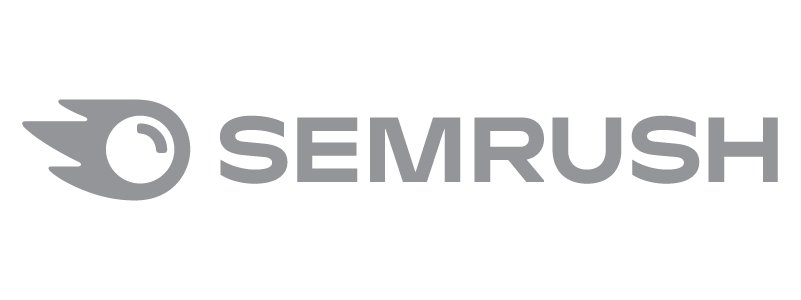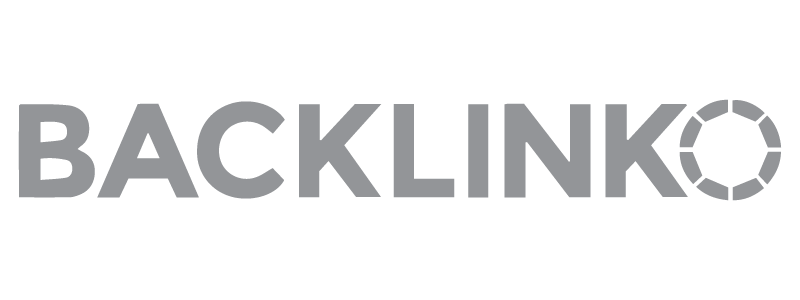If you have ever thought about how to start an online business of your own, now is a great time to finally roll up your sleeves. In the wake of COVID-19, the ecommerce world was flooded with new activity from all sectors. Although growth has slowed since then, there’s still plenty of room in the market.
How To Start An Online Business
- Research Business Models
- Decide Your Niche
- Conduct Competitive Analysis
- Define Your Brand And Target Audience
- Set Up Business Logistics
- Build Your Website and Marketing Automation
- Promote Your Business
People can make money online in lots of different ways. They can open an online store, write a blog, or become popular on social media. In this post, we will dive into the different models and guide you step-by-step to launching your own online business.
Why Start An Online Business From Home
Online businesses can be profitable with low startup costs. The ecommerce market is growing, especially due to COVID-19, offering many opportunities.
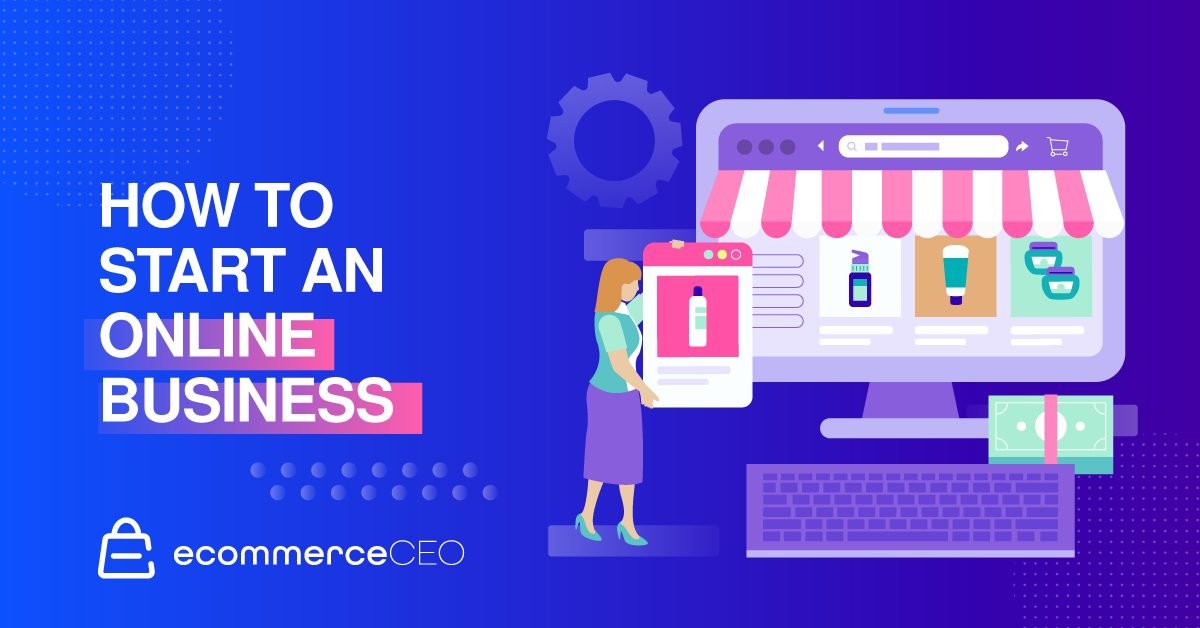
Some of the richest people in the world got their start with online businesses. With the right business plan and commitment, you can reach customers worldwide.
Types of Online Business Models
Online businesses come in all shapes and sizes. You don’t have to be the next Amazon ecommerce marketplace or Netflix to be successful.
When it comes to online business models there are a few major buckets to consider.
- Physical Products: Selling products like t-shirts through online retail
- Digital Products: Like courses, ebooks, or software
- Media / Publisher: Selling ads, affiliate marketing, or sponsored content
- Services: Exchanging time for money by providing services like logo design or marketing
We have hundreds of online business ideas you can start, but I wanted to highlight a few ones in each of those buckets.
Physical Products
An ecommerce store is likely the first thing you think of when it comes to online businesses. Instead of shopping in person, customers make purchases over the internet.
In essence, your website replaces the store. Customers browse and buy your products or services online, and then you ship the order to them.
Online stores offer advantages over brick-and-mortar. Customers anywhere in the world can shop with you regardless of location. Plus, a virtual storefront means lower overhead.
Dropshipping
A dropshipping business is great for its simplicity. To the customer, they operate just like any other ecommerce store. But in actuality, your internet business is just the middleman.
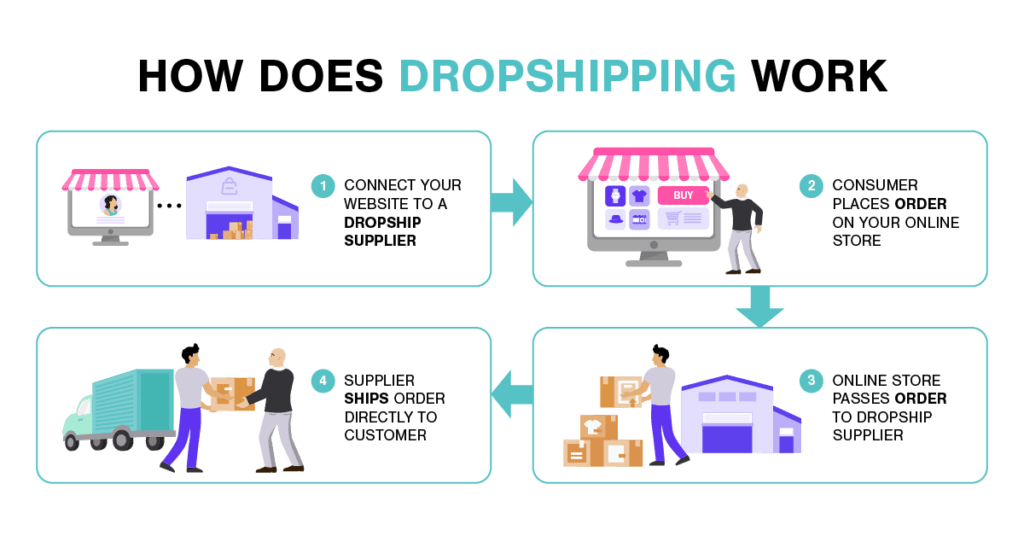
When a customer places an order, you send the order to the drop shipper. The drop shipper fulfills and ships the order to your customer.
Digital Products
Selling digital products online is very low overhead, but it’s highly competitive. If you have unique skills or knowledge, create digital products to monetize your expertise.
If you have experience in graphic design or web development, create and sell online courses. Or, maybe you’re a talented writer who could create and sell ebooks, audiobooks, or other digital content.
The possibilities for digital products are almost endless. All it takes is some creativity and hard work to get started.
Launch An App Or SaaS Startup
In today’s digital era, launching an app can be a viable business online.
With an innovative app idea, you could tap into a potentially huge market. If you have the technical skill to create it, or the resources to hire someone to do it for you, it could be lucrative.
To successfully launch an app, identify a problem or need your target audience has. Then, address it with your app. Invest time and resources into promoting your app to get it noticed. In a crowded marketplace, marketing can make or break you.
Remember, developing an app is only the first step – you still have to market it.
Ebooks or Courses
Have a passion for sharing what you know with others? Create and sell ebooks or online courses. It can be a long-term viable business since you can create content on almost any topic. Ideas include cooking and fitness, entrepreneurship, and personal development.
For success, pinpoint your target audience. Create content that speaks to their needs and preferences. Spend time building your brand and promoting your products. Use social media, email marketing, and other channels.
Media Publishing Company
You can start a media company with almost no resources other than yourself. Again, a low barrier to entry means tight competition.
Starting a media publishing company involves creating content for your target audience. You can create written, video, or audio content. Then, you monetize it with advertising or other methods.

This business model is highly scalable. Healthline is a publishing company that generates $100M+ per year.
To compete in this space, focus on consistently producing high-quality engaging content. It will help you build a loyal audience. Learn about online advertising and marketing strategies to maximize revenue potential.
Affiliate Marketing
Affiliate marketing allows you to promote and sell without handling products. Your job is to promote affiliate products and drive traffic to the partner’s website.
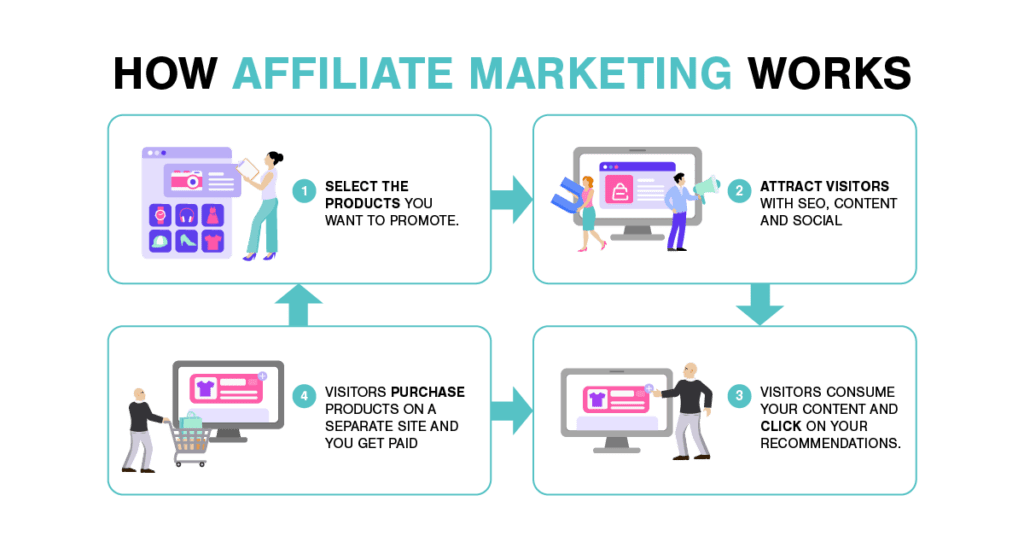
You earn a commission when customers use your affiliate link to make a purchase. The company selling the product handles processing and shipping the order. You are responsible for encouraging the sale and directing traffic with referral links.
Blogging
Blogging is a large and varied category for online businesses. There is a wide range of blogs and many ways to monetize them. For example, some people make blogs as a hobby, while others use them for affiliate programs.
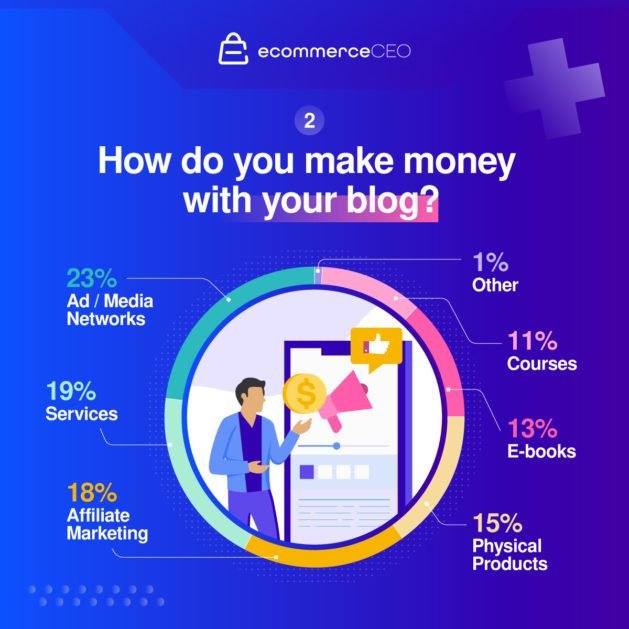
Blogs can make money selling ad space, sponsored posts, or ecommerce. You can even work as a blogger by creating content for other companies’ blogs. Blogging can be great as a part-time job or full-time gig.
Launch A YouTube Channel
What are you passionate about? Create videos about what you love, and build a following of interested viewers. After you build a loyal audience, monetize your channel with:
- Advertising
- Product sales
- Sponsorships
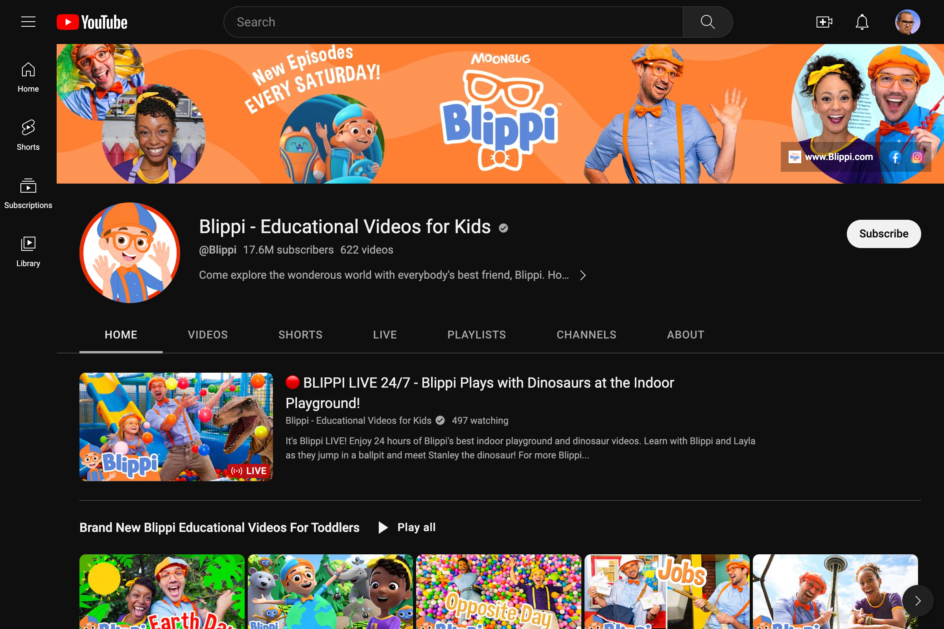
Most full-time YouTubers make $60K per year. But people like Blippi make a ton more. In fact, his net worth is around his total YouTube subscribers.
Become an Instagram Influencer
These days anyone can become an influencer. That’s if you don’t mind being the “face” of your business. I prefer to pass on that. With that said, influencers can make a killing by putting themselves in the spotlight.
Services
Trading hours for money is the basic idea behind selling services. If you have a particular skill set or expertise, you can offer your services online to those who need them. This includes things like:
- Web design
- Social media management
- Content creation
- Virtual assistance
Use platforms like Fiverr or Upwork to find clients and build your reputation.
Web Design Services
If you have web design skills, leverage them to build websites for others. If you have software development experience, this is a lucrative business opportunity.
Many tools can help non-technical people build websites. But business owners don’t have the time to do it. Beyond websites, you can also create and manage social media accounts.
Marketing Agency
Have a background in marketing? Experience in social media, content marketing, or search engine optimization (SEO)? You can offer your expertise to help other businesses grow. These businesses tend to have a lot of overhead, but you can easily build and sell a marketing agency for seven figures.
Start With a Niche in Mind
Before starting your online business, you have to know what you will be selling. This could be a product, a service, or an idea.
For example, selling a cool t-shirt design differs from selling a website-building service. Once you know what you want to focus on (this can be many things), you can start developing your strategy.
Some questions you will want to ask yourself are:
- What am I selling?
- Do I need or want a website?
- What will my company (and website) name be?
- Will I have stock to manage?
- Do I need to hire anyone?
What you are selling will help answer most of these questions. And you’ll learn things along the way. But first, what are you selling, and how will you make money?
Conduct Competitive Research
Whatever it is you are selling, you will have competition. Before you get started, do some competitive analysis of the market as a whole.
Begin With Basic Keyword Research On Google
Start with basic keyword research on Google. Identify keywords that are relevant to what you’re selling and see who shows up in the search results. Note their website, pricing, products or services, and any unique selling propositions.
Next, delve deeper into their online presence. Visit their website, social media profiles, and any other online platforms they use. Pay attention to:
The design and user experience of their website
How they engage with their audience on social media
Any content they create
This will help you identify what’s trending and the competitive discovery process.
Conducting product research is important. Entering a highly competitive industry with established competitors makes a difficult battle. When it’s hard to carve out your market share, you stifle growth before you even start.
What is the competition doing well? Where could they make improvements? Exploit the areas of improvement for your own benefit.
Your market research could show competitors pricing products too high. It could show poor customer service. Ensuring you do better may determine product viability. If you cannot, it will point you to another business niche.
Define Your Brand and Target Audience
Think about what you want your brand to communities. Beyond the name, consider your color scheme, logo, and mission statement.
You might have an idea or starting point for defining your brand and company image, but you’re not stuck with it. Amazon grew from an online bookseller to a global marketplace. Your brand will likely evolve and settle into its niche.
Define Your Target Audience
What you are selling will also determine who your target audience is. Are you selling to other businesses or customers? Who are they? What social media platforms do they use?
Define and understand your target audience to shape your business and marketing strategy. Your target market will likely change over time. You may notice a difference between your ideal and actual customers, too.
Analytics tools help identify your audience and track what works and what doesn’t. Your customer demographics determine how you run your business (and make money.) It also impacts your social media marketing.
Trademark Your Brand Name
Once you have defined your brand name and image, it is important to protect them legally. Register a trademark for your brand name to ensure no one else can use it or create confusion in the market.
This important step helps establish your business and protects your intellectual property. It’s helpful to consult with an attorney to navigate the process. This ensures you don’t miss anything when securing your trademark,
Create Your Business
Creating your online presence isn’t enough to start your business. You must officially register your company. You can find original and distinctive names for your business with the use of a business name generator.Generally, it’s okay to start working and make a few sales. But you’ll eventually need to make things official.
Take all Necessary Legal Steps
You will need to address some legal aspects when creating your company. A licensed and registered business provides personal legal protection.
First, make sure you choose the right business structure. Depending on your location, products, and services, you may need a business permit. You may also need a federal business license. In most cases, you will need a federal business license.
Here are the main legal hoops you will need to jump through:
Register Your Business
Don’t let the idea of registering a business scare you. It’s paperwork and paying fees.
You can expect to:
- Register your new business name and optional Doing Business As (DBA)
- Choose your business’s legal structure: limited liability company (LLC), partnership, etc.
- A Federal Tax ID (or EIN)
- Other licenses and permits
Opting for a sole proprietorship allows you to skip many steps. That’s why many people getting started take this route. However, this doesn’t legally separate you from your business. If something goes wrong, you put your personal assets at risk.
If you’re confident in your business, save time and register your business at the start. A DBA and Federal Tax ID can also provide other perks.
Get Tax IDs
After getting your federal tax ID and business license, get your state and local tax IDs. You may have more paperwork for taxes and permits.
Get All Necessary Licenses
Certain types of businesses have licensing requirements. Common business licenses you may encounter include:
- Federal business license
- Sales tax license
- Home occupation permit
- Specific industry licensing
- Permits for regulated products
Your needs depend on your business and the products or services you’ll sell. Your local government or the Small Business Administration can help you.
Remember that sole proprietorship can avoid a lot of these requirements.
You must abide by all regulations where you do business. This includes across state lines or international borders.
Open a Business Bank Account
A separate business bank account is crucial. It simplifies your accounting to keep your business revenue separate from personal income. You need a registered business tax ID to open a business checking account.
As a sole proprietor, you can still open a separate bank account to manage personal and company funds.
Choose a Payment Gateway
Whether you sell B2B or B2C, you need a system for handling payments. Popular ecommerce tools integrate with third-party services so you can collect customer payments.
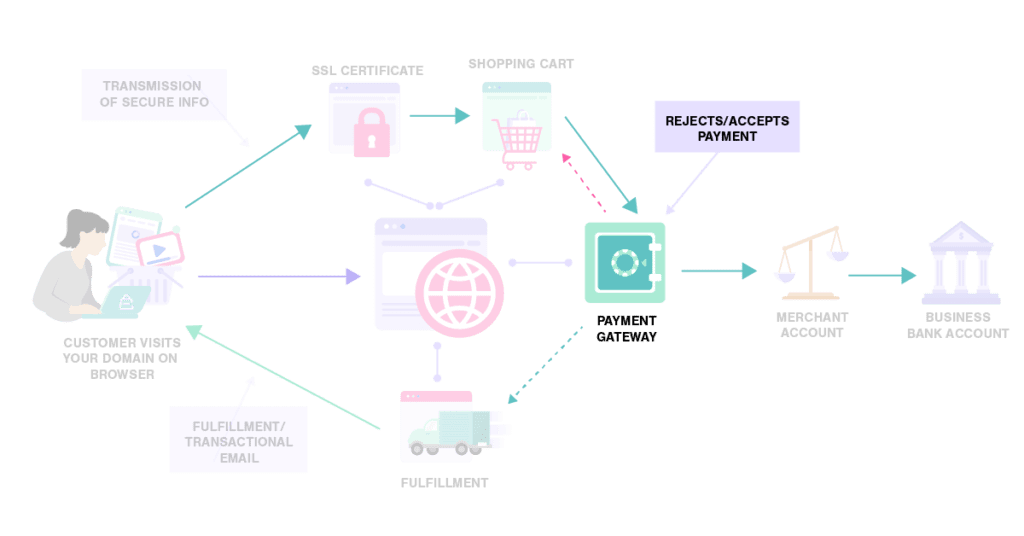
You must connect your payment gateway to your business account to accept payments. Your location and the ecommerce tools you use determine available payment gateway options.
Set up Taxes
As with any business, you must track your earnings and pay business taxes. Consider hiring an accountant to help you get started if you can afford one. Keep clear and accurate records to ensure you’re ready for tax time.
Build Your Website
Your website serves as your storefront and a direct representation of your company. Building an effective and attractive website is essential for a successful online business. Luckily, there are tools you can use to build a website without technical skill.
Choose the Website Platform
Thanks to many different ecommerce platforms, it’s easy to start an online business. If you’ve got general computer skills, you can build an ecommerce website yourself.
Popular codeless ecommerce platforms include:
There are others, though these make up the vast majority of websites that aren’t coded from scratch. In fact, WordPress powers roughly 40% of all websites on the internet!
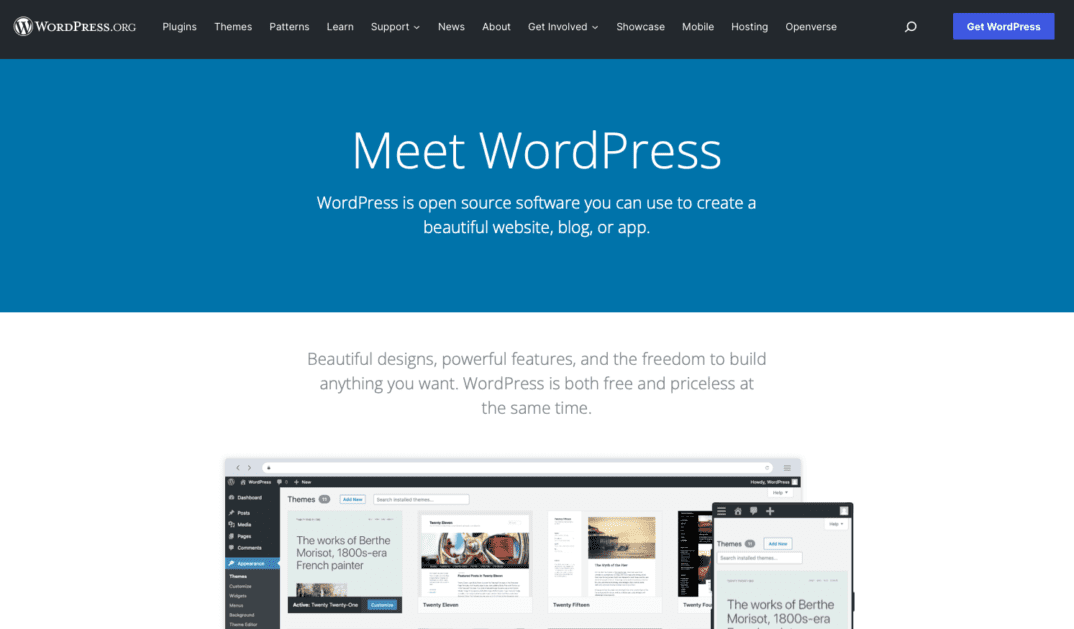
The beauty of WordPress is it is free, open-source software. Developers can create custom plugins, so no matter what feature you need, you can find it. This makes it easy to build your website without technical knowledge.
With its popularity, you can find step-by-step guides for anything you may need.
Shopify is an easier website builder for creating a basic ecommerce store, though it will require a monthly fee. It uses simple templates for creating product pages to sell your goods online. This is a popular option among small business owners.
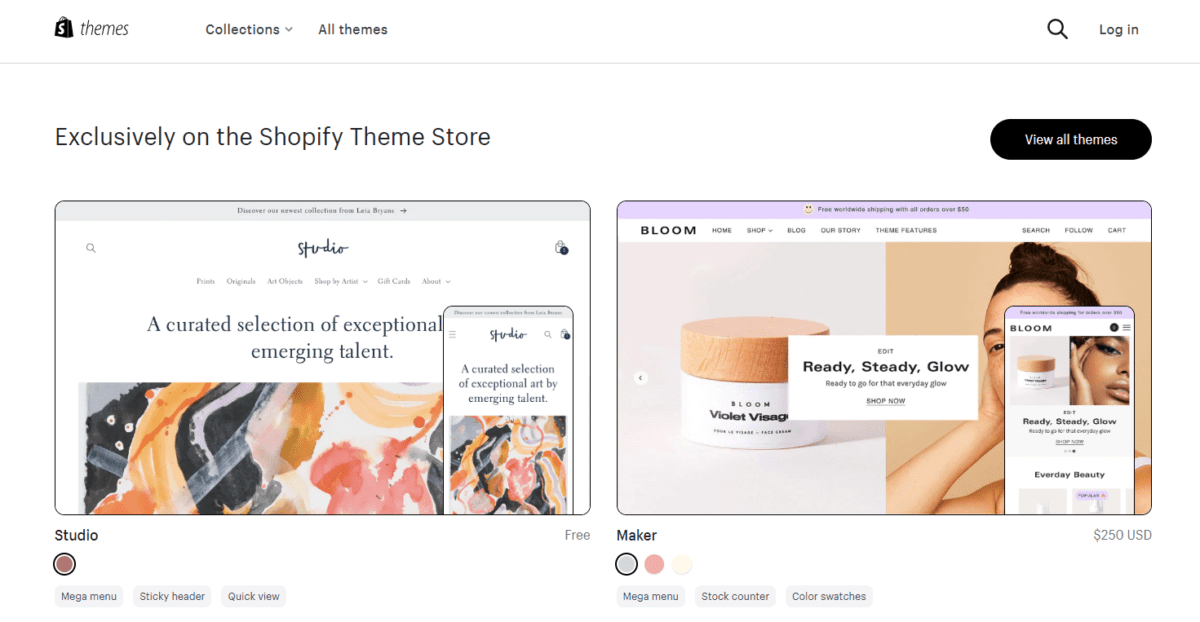
WordPress may be free, but there are ongoing expenses, including:
- Domain name
- Web hosting plan
- Premium plugins
Find a balance between cost and service when you choose an ecommerce platform.
If you are selling digital products, consider using an online course platform.
If you’re not ready to build a website, use marketplaces like Amazon, eBay, or Etsy to sell your goods. The downside of this business plan is marketplace fees, which can eat into your profits.
Set Up Marketing Automation
Once you have your ecommerce platform set up, it’s time to start thinking about how to market your business. One of the most effective ways to do this is through marketing automation.
Marketing automation refers to software that automates repetitive tasks. This can include email marketing, social media posting, and advertising campaigns. This can save you a lot of time and effort while still achieving great results.
To start using marketing automation, create a customer database. Collect customer information through your website or social media accounts. Use the data to segment customers into different groups. From there, send them targeted messaging.
Email Marketing
Email marketing is one of the most important tools in your marketing arsenal. With it, you can reach customers directly in their inboxes. When done properly, it increases brand awareness and sales.
To start, build an email list. Offer something of value, such as a free book, discount code, or webinar. Subscribers get access to your offering in exchange for their email addresses.
After building your list, use an email marketing platform such as Mailchimp or Constant Contact to create and send emails.
Personalize and offer value to your subscribers with each email you send. Segment your list based on consumer behavior and interests to boost engagement.
Landing Pages
A landing page is a standalone page designed to convert visitors into customers or leads. Effective landing pages have:
- Clear and concise messaging
- A strong call-to-action
- A form for visitors to fill out to become a lead or make a purchase
When creating your landing page, keep in mind your target audience and what will appeal to them. Use eye-catching visuals and persuasive copy to convince visitors to take action. Tools like Unbounce or LeadPages make it easy to create landing pages without coding knowledge.
Funnel Set Up
To maximize your online business success, it’s important to set up a sales funnel. A sales funnel is a step-by-step process that guides potential customers toward buying.
Typically, it starts with the awareness stage. This is where visitors discover your brand. From there, you’ll move them to the interest and consideration stages. Here, they’ll learn more about your products or services. The end goal is to move them to the decision stage, where they make the decision to purchase.
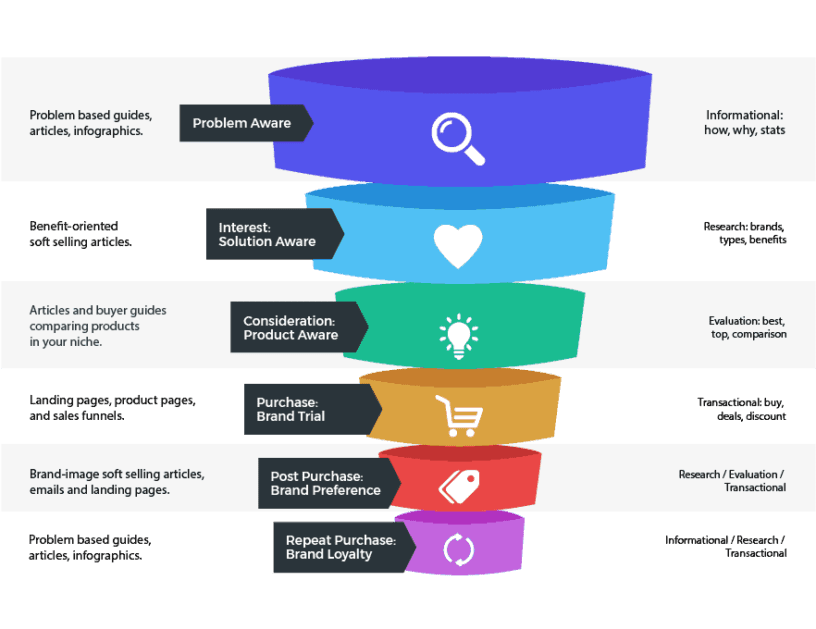
Setting up your sales funnel involves:
- Identifying key steps customers take before they buy
- Creating content and offers to guide them through each stage
For example, you can offer a free trial or consultation.
Market Your Website
Marketing is crucial to help your business grow. To effectively market your online business, understand your target audience. Once you know who your ideal customer is, you can use various strategies to reach them.
Content Marketing and SEO
Using content marketing and SEO can attract potential customers and improve your search rankings. Creating high-quality, relevant content using keywords related to your niche can organic visibility.
Start by identifying topics and keywords relevant to your business. Then, create content around those phrases. You’re not limited to blog posts – you can also create infographics, videos, and more.
Optimize the content with proper headings and meta descriptions to improve ranking potential.
Facebook and Instagram Ads
To build a social media following and increase brand awareness, run ads. Facebook and Instagram make it easy to create targeted ads based on:
- Demographics
- Interests
- Behaviors
To get started, set up a Facebook Business Manager account and connect it to your website. Then, create your ad campaign with an objective that aligns with your business goals. You can choose from options such as brand awareness, website traffic, and conversions.
Create visually appealing graphics and compelling ad copy. Everything should speak directly to your target audience. Use A/B testing to refine your ads over time and achieve a return on ad spend.
Influencer Marketing and PR
Find influencers who have a following in your niche. Reach out about collaborations on content or promotions to tap into their audience.
Use PR tactics such as press releases and media outreach to gain exposure for your business. Focus on relevant journalists and publications because they’re more likely to feature your brand.
Building relationships with influencers and journalists takes time and effort. Don’t expect immediate results. With consistent outreach and quality content, you can establish yourself as an authority.
Retargeting
Retargeting involves showing ads to users who have already interacted with your brand. It reminds them of what they’ve viewed and encourages them to complete the purchase.
To set up retargeting, install a tracking pixel on your website. Then, you’ll create ads targeted at those who have interacted with your site. You can use platforms like Google AdWords or Facebook Ads to create and manage your retargeting campaigns.
Conversion Rate Optimization (CRO)
It’s not enough to drive traffic to your website. For success, that traffic needs to convert to customers. CRO is strategically editing your website design and content to increase conversions.
To leverage CRO, analyze your website data using tools such as Google Analytics. Find pages with high bounce rates or low conversion rates. Make adjustments to improve the user experience. For example, simplify navigation or make your calls-to-action clearer.
Use split testing to identify the changes that are most effective.
Successful Online Businesses You Can Learn From
While every online business is different, we can learn from those who paved the way. Here are some strong ecommerce examples:
Amazon
We’ve already mentioned Amazon a few times, with good reason.
Why? Because Amazon is the be-all and end-all of ecommerce business. It started as a small operation selling used books out of a garage. It grew to control more than a third of all ecommerce in the United States. You can’t ignore Amazon.
Amazon followed many of the tips we’ve covered in this article. (You could argue that they wrote the book on successful online business).
But Amazon started with a focus on one product category: Books. Its target market was people who wanted to save money and enjoy the convenience of delivery.
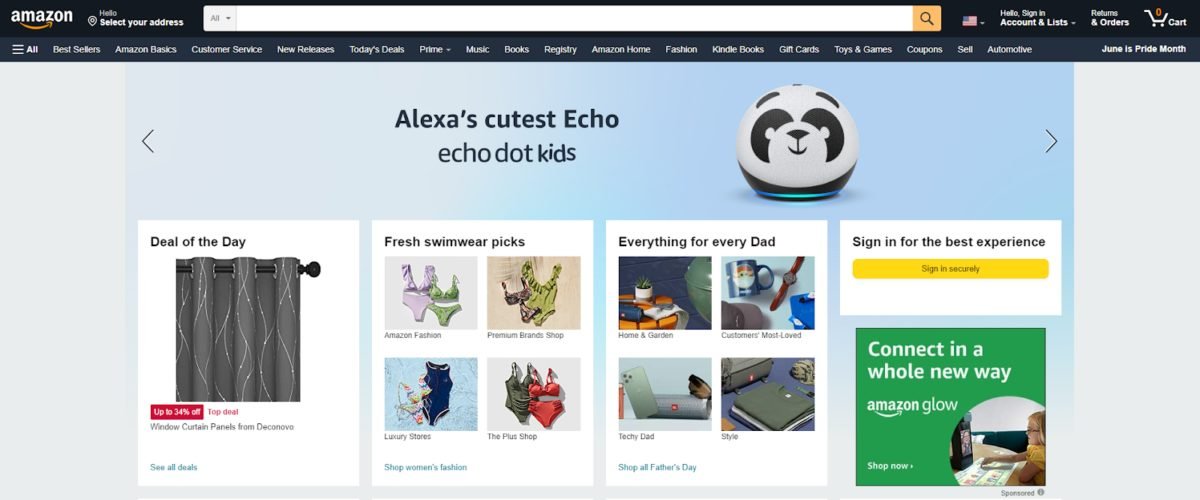
They embraced their success and continued to grow the brand around those strengths. They expanded into other product categories and now offer countless products and services.
With them, we learn how to focus on our strengths and look for growth opportunities.
Etsy
Etsy is another good example of a simple idea that turned into a huge success. Etsy started as a small online business that focused on the sale of homemade goods. This differed from marketplaces like Amazon, which sold mass-produced items.
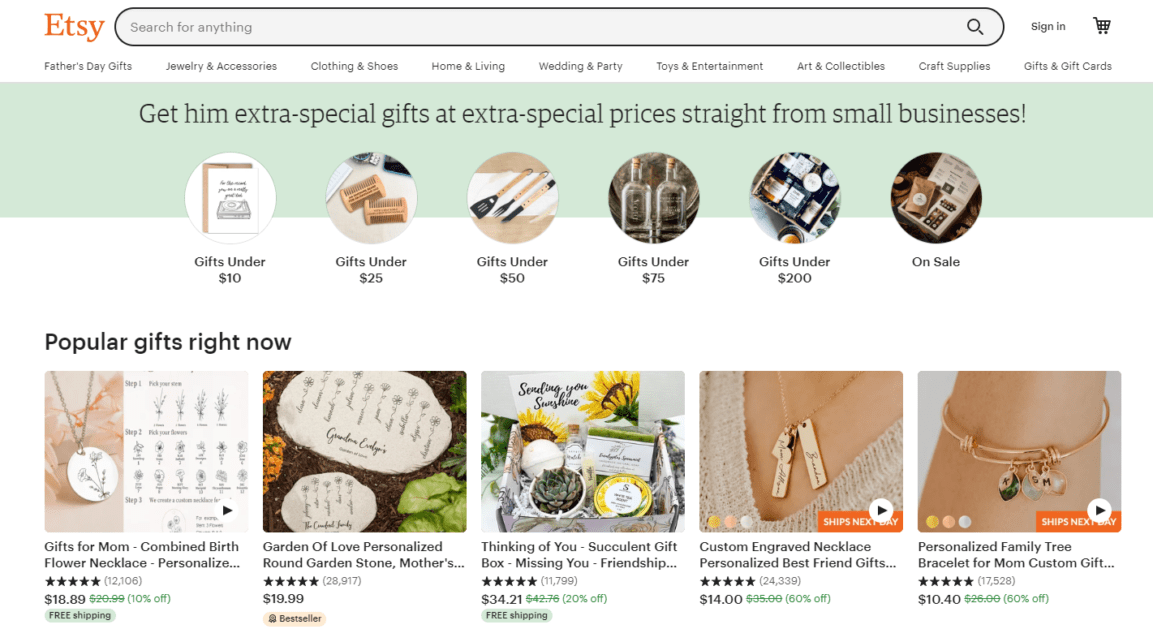
Etsy stayed true to its concept. It is a popular platform for artists and crafters who don’t want to compete with factory-made goods. Their business model was a success, offering niche products you can’t find anywhere else.
eBay
EBay revolutionized ecommerce with its new business plan of online auctions. Rather than selling products, eBay built a business around allowing others to sell.
eBay inspired many other ecommerce websites to follow a similar approach.
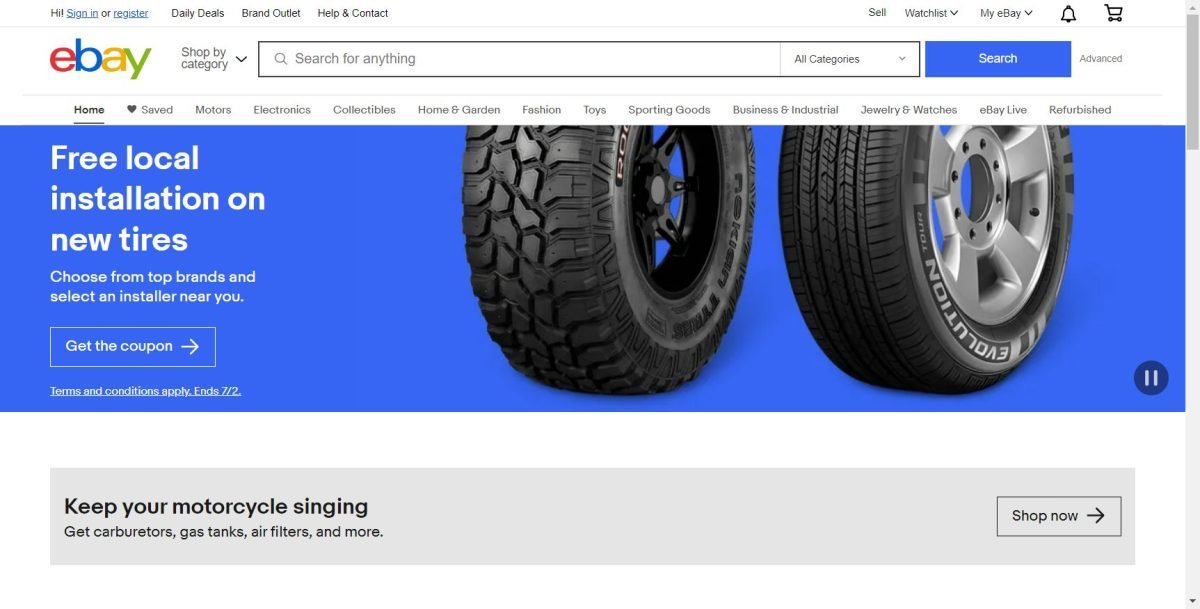
Each of these ultra-popular websites started as a small ecommerce business before making it big. We can apply the same strategies to our own online business plans.
FAQs
Start Creating Your Online Business
Now you are ready to start planning your own online business endeavors. Chances are it won’t be quick, and it won’t be easy. With a bit of luck and persistence, you can launch a successful online business.
Before, it took specialized knowledge and big risks to make money online. Now abundant opportunities for those looking to break into ecommerce. No matter your strengths or skill level, there is a solution for how to start an online business.
With a little bit of elbow grease, you can turn your side hustle into a profitable business.






